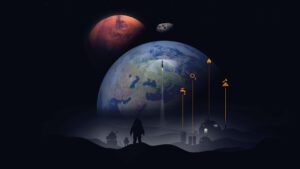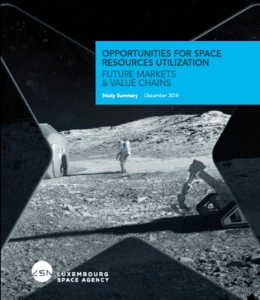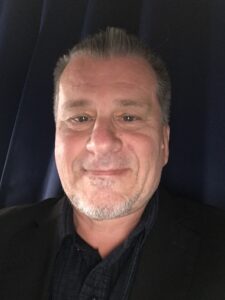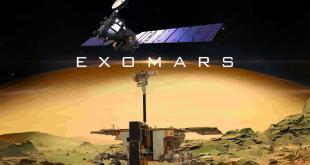By Christophe Bosquillon
This is Part 1 of a review of Space Resources Week 2022, the descriptive part. Part 2 may appear in a subsequent edition with the author’s more personal views on several space resource utilization topics in the context of SRW.

We recently attended online the 2022 hybrid 4th edition of Space Resources Week, held in Luxembourg from May 3 to 5. A brief history of this event may remind our readers that, while the 2021 3rd edition was also hybrid, the pre-pandemic 2019 2nd edition managed to produce video material that can still be consulted on the website.
The 1st edition dates back to 2016, when the Spaceresources.lu initiative pioneered Luxembourg’s national interest in the space domain: foreign direct investment and regulatory efforts as a jurisdiction focused on leading in space resources utilization. The importance of which is now well acknowledged across not only the whole of European space stakeholders, but sizeable extra-European space actors like US and NASA, or Japan, with JAXA and iSpace European branch. And indeed, while the Space Resources Week (SRW) event itself is strongly anchored in the European ecosystem, its reach is global, with about a hundred international speakers.
As Luxembourg’s Minister of the Economy Franz Fayot mentioned during his opening remarks, “This event is recognized worldwide and key in bringing the international community together. It underlines the central role of Luxembourg in this field. While space resources offer a means of exploring the Moon and the solar system in a sustainable way, the space resources field can also be a way of stimulating innovation on Earth and finding new ways to address global challenges.”
Space Resources Week, an ESRIC-ESA partnership
Organized as a partnership between ESRIC and ESA (the European Space Resources Innovation Centre and the European Space Agency), the Luxembourg part of the SRW equation benefits from involvement by LSA and LIST (the Luxembourg Space Agency and the Luxembourg Institute for Science and Technology).
While the Space Resources Week event itself is strongly anchored in the European ecosystem, its reach is global.
For our readers still not familiar with ESRIC – established in Luxembourg in August 2020, and you may verify its mission statement online – what we’d say ESRIC does, is to help Luxembourg and Europe, and by extension the whole world, to get unstuck from ‘chicken and egg’ new space business situations, often encountered due to the lack of any real market beyond orbit. So ESRIC understands that the keys are, to not only grow the ecosystem of start-ups, but to help them develop a viable relationship with larger corporate actors and anchor customers, and to do so by developing techno-economic reckoning and funding along entire value chains. What is required to augment deal flows between mainstream industries not yet involved in space market and ‘space industry’ providers? Is commercial and technical maturity sufficient? But also, for customers to be able to sign on providers, mutual understanding and shared aims at techno-economic and ESG benefits. There again are implications for the role of the public sector – governments and space agencies – as anchor customers and seed- funders, while working out terms for multi-industry financial instruments to support space value chains.
New ESRIC leadership and a knowledge-sharing platform

While former director Mathias Link took the stage for SRW 2022 closing statements, it turns out the ESRIC directorship baton had passed in April to Dr. Kathryn Hadler, a mineral processing and recovery scientist: her keynote speech revealed the launch of a knowledge-sharing platform for the space resources community, an idea presented last year and now implemented thanks to the LIST’s engineers. “One of the main expectations of the space resource community is to have access to a centralised and easily exploitable knowledge base. ESRIC’s knowledge-sharing platform is of great interest to researchers, but it can also highlight business opportunities,” said Kathryn Hadler, to which Thomas Kallstenius, CEO of LIST added: “Based on technology developed at LIST, this platform is applicable in the field of space resources but could be transposed to other research areas. It is a fantastic tool to link the business vision with the scientific vision”.
This year’s edition focused on the development of a circular economy and a waste recycling system in space, and all the environmental, ethical, and economic sustainability matters related to space mining.
As one could judge through in-presence on-stage questions and the online chat, this message resonated with the over a thousand people attending SRW, whether their interests spanned the business, legal, or tech fields, or all of the above. Especially as these questions intersect with the necessities of functional funding processes as well as the demand for sustainable governance mechanisms. Notwithstanding the fact, this 2022 SRW edition put a direct emphasis on sustainability, circular economy, environmental preservation, and waste treatment in space.
Visibility for 5 start-ups pre-incubated under ESRIC ‘Start-up Support Programme’
ESRIC has launched the Start-up Support Programme (SSP) in order to provide early-stage start-ups in the space resources sector with support in 3 key areas: first, to develop their value proposition and a concrete business plan that addresses well-identified real-world customers (rather than a ‘vision plan’ that addresses abstract and vaguely quantified ‘total addressable markets’); second, to effectively engage and make their first deals with their first customers; and third, secure sufficient pre-incubation funding with relevant initial investments.
What is required to augment deal flows between mainstream industries not yet involved in space market and ‘space industry’ providers?
It can’t be emphasized enough that for a start-up founders’ team with little time, bandwidth, and resources for robust managerial development (before even starting to talk about the cost of acquisition of new customers), the cost of acquisition of initial investors is hardly manageable. In that sense, this initiative by ESRIC is instrumental to enable start-ups to simply exist. In addition to specific challenges encountered in the space resources domain, we would even argue that, not just in space but in (deep) tech at large, the system is somehow ‘broken’. In fact a system that can bring together start-ups and investors and also also venture partners developing value propositions and deal flows at the moment doesn’t exist, or there’s room for improvement. So ESRIC’s SSP is a move in a right direction, and a proper pathway in order to start small and scale up.
In that context, the Space Resources Week is also an opportunity to showcase the 5 promising start-ups that were selected by ESRIC’s SSP: Astroport Space Technologies, Anisoprint, Adventus Interstellar, Four Point, and Orbit Recycling were enabled to present on stage, and it is hoped that this visibility will contribute to trigger a virtuous cycle. In addition to this, it should also be mentioned that ESA jointly with ESRIC, has created the ‘ESA-ESRIC Space Resources Challenge’, the first European robotics challenge of this nature focused on space resources. Its aim is to help identify prospecting technologies that can be integrated and operationalized in future ESA missions. The grande finale of this challenge will take place in September 2022 at the Rockhal in Belval, so, stay tuned.
An intense program over 3 days
With over 100 speakers, we’re not going into a detailed review of each of the pitches and fireside chats, however we encourage interested readers who missed the event to watch out for when SRW releases the recordings and materials on their website, and to start ‘mining’.
We’ll start our quick review with the 3rd and last day, when everyone is fairly exhausted yet keeps going: the morning scientific session brought a great overview of the ISRU state of the art for the Moon, asteroids, and Mars, and it instilled a fairly strong dose of the kind of realism we need to keep injecting in our techno-economic expectations and manageable TRLs over time. We were quite impressed by the session on analogues and the pivotal technology of ‘simulants’ to mimic regolith from Moon and Mars. The ESA initiative to develop a self-reliant sourcing of simulants and ‘Sample Analogue Curation Facility’ sounds à propos for strategic autonomy. Next, the “Enabling Infrastructures” sessions covered critical building blocks from cislunar transportation to energy to metallurgy to vehicles to autonomous systems in mining, etc. In our view the company OHB value proposition as it has evolved is essential to solve the small payload transportation and lunar access problem for all relevant customers. Capability demonstrations were quite convincing, from these amazing Nanoracks to Moon mapping, and many others, from all over the world, including Africa. And the concluding round table discussions covered “Pilot plant: the next steps”, which is exactly the goal we need to set for ourselves, ‘internationally’.
The ESA initiative to develop a self-reliant sourcing of simulants and ‘Sample Analogue Curation Facility’ sounds à propos for strategic autonomy.
Which brings us to the 1st half-day and 2nd full day, during which the concept of “there is so much to tackle that we need to cooperate internationally” underpin the whole event. While we were honoured to hear NASA’s envisioned future priorities plan for ISRU, University of Notre Dame (pronounced differently than in Paris) reminded us that the Moon needs an international lunar resources prospecting campaign (ILRPC). An update on MOXIE, speakers from JAXA and iSpace Europe further made that point. iSpace clarified a resources-to-reserves assessment due process with its LORS framework. OffWorld and Manna demonstrated wise business models built equally on terrestrial and beyond orbit markets. Meanwhile, when favouring autonomous systems as substitutes to biological Earthlings, David Bowie was also present through Space Resources’ pitch “Let all the robots boogie”. The Euro2Moon project launched by Airbus, Air Liquide and iSpace Europe, a non-profit European platform to explore future uses of natural lunar resources, demonstrated how well we work between friends and allies outside Europe.
The 2022 edition of SRW strongly hinted there are plenty of opportunities for cross-pollination between use cases on Earth and in space, and potential avenues for space activities benefit sharing, worldwide. This is because this year’s edition focused on the development of a circular economy and a waste recycling system in space, and all the environmental, ethical, and economic sustainability matters related to space mining. This made the 2nd day’s legal and regulatory session even more palatable, because it tackled really concrete issues we can relate to, including the reference to the mining concept of a ‘Social License to Operate’.
Furthermore, we particularly appreciated the panel discussion under the umbrella of the ESA Innovation and Ventures Office, which nicely called the audience’s attention by naming itself ‘How to make the Moon bankable?’. The conversation emphasized developing sustainable value chains that speak to investors, while optimizing the role of government and space agencies as ‘anchor’ customers, to establish financial trust among stakeholders (other than that, we do need a bigger ESA budget, please).
We’ll be looking forward to the 2023 edition of SRW
This concludes Part 1 of a review of Space Resources Week 2022 (SRW), the descriptive part. Part 2 may appear in a subsequent edition with the author’s more personal views on several space resource utilization topics in the context of SRW. In particular, as they resonate from a terrestrial mining industry standpoint. Also taking into account the cost of shipping material in space along the full value chain from mine to transformation to utilization. A cost that will impact the competitiveness of space-faring nations based on their ‘space shipping’ capabilities and cargo/propellant ratio. A cost that will either make or break the commercial and financial viability of supply chains for a number of resources extracted for example from the Moon. Further considering that, for any space activity, in orbit, in cislunar space, near and or the Moon, and beyond, toward asteroids and Mars, data has a value chain of its own. And that security of SRU assets in orbit and beyond does matter. All being considered, we’ll be looking forward to the 2023 edition of SRW.

Currently based in Europe, Christophe Bosquillon operated globally out of the Indo-Pacific for the best part of the past decades. With a techno-economic background in non-space industries, as well as international affairs and foreign direct investment, Chris maintains a long-standing interest in old and new space, also from a security and policy standpoint. A decade ago, he developed a ‘Legal Hacker’ interest in the digital transformation governance field, data rights, computational law, and composable governance. Founder of Autonomous Space Futures Ltd., Chris, an experienced corporate boss and business owner, focuses on solutions to develop business cases in and beyond orbit: value propositions TRL-realistic over time, commercially credible, financially sustainable, legally implementable ; optimizing open data and registration in a context of adaptive governance for peaceful and sustainable space activities. While fixing the investee-investors relationship, value creation, and funding processes, Chris currently works out on the steep learning curve of space law, governance, and diplomacy, with the help of diverse friends from all over our precious blue planet.
With several masters but “too busy for a PhD”, Chris did evolve, lately: being surrounded by doctors and candidates with collaborative pursuits in digital and space law, governance, and policy, does help to collectively re-imagine a future as responsible stakeholders, and design sustainability solutions. Chris likes to bring down siloed mentalities and bridge practitioners and academia, across transdisciplinary teams that produce useful, usable, and used outputs.





